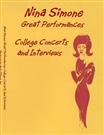|
|
||||
|
|
by Donald Levit  Uneven like its subject’s output -- “39 albums, and they pirated 70” -- Nina Simone: College Performances & Interviews builds to a crescendo that leaves one wishing for more than its sixty minutes. In attendance in the second pew sat first-time director/editor/co-producer/equalizer Andy Stroud, eighty-five, once the singer’s manager-producer, one of her two exes, and father of her only child Lisa Celeste. Wheelchaired and weary from a stroke, he said simply that “it had to be done now,” that there remains a lot more of the footage taken by “independent operators,” and that these records of two conspicuously different college settings were in such fragments that a single song might be spliced whole from several clips (in places, unfortunately truncated). Prefaced by the National Jazz Museum Harlem All-Star quartet celebrating the honoree’s songs, the one-night tribute was a joint effort among Target, the Historic Harlem Park Coalition and community-oriented documentary specialist Maysles Cinema (founded by Albert Maysles and with a “suggested donation” but turning away no one). Rain moved the free park event indoors, where Mount Morris Presbyterian Church proved perfect for the artist born Eunice Kathleen Waymon -- Stroud said she invented the stage name out of whole cloth -- whose mother was a Methodist minister and who began in a church choir. The three decades before her death in 2003, the self-exiled High Priestess slipped into diagnosed schizophrenia and was difficult for audiences and for governments in Influencing and influenced by friends James Baldwin, Langston Hughes and Lisa’s godmother Lorraine Hansberry, she took performance as a vehicle. Interviewed in what almost seems sepia with one red Bloody Mary, she is clear on the superior ancient civilizations of black She was notorious for acid asides, usually directed at unruly patrons and uncomfortable Caucasians but not exclusively so -- “For the very first time in your lives, act like ladies and gentlemen at the Apollo” -- but in these rare and convincing interviews her comments struck responsive chords from the church audience. Ditto her remarks on “completely spontaneous” sinuous dance-moving during numbers, churchly trance-like and in one extended take a real highlight: with her teacher, individual self-expression not to be studied or choreographed. The second concert is at Atlanta’s historically black Morehouse College, its cinderblock gymnasium a telling contrast to the more polished New England venue and so itself a reinforcement of the message. Still slim then, slinky in all black, she could be a magnificent performer (who also did a distressing lot of disappointing live and recorded work). Some numbers in this too brief film are more inspired than others, and the whole closes with the obvious but true choice of her version of Paul Anka’s “My Way” over a series of family photographs through the years, some of them puzzlingly repeated. Hughes wrote that “you either like her or you don’t. If you don’t, you won’t.” Aside from the high moments in these two concerts with none of today’s visual gimmickry, the plain speech from Simone (sometimes beside young Lisa) helps fill out her total position that needs no justification. Written expressly for her, “Don’t Let Me Be Misunderstood” is not here -- “So you [Eric Burdon] are the honky who stole my song and got a hit out of it?” -- but Nina Simone: College Performances & Interviews goes far towards fulfilling that song’s request. Sam Waymon’s proposed biopic on his famous sister remains undone after fourteen years, so Stroud’s contribution stands as the definitive cinema Nina Simone. (Released by Andy Stroud Inc. Not rated by MPAA.) |
||
|
© 2026 - ReelTalk Movie Reviews Website designed by Dot Pitch Studios, LLC |



